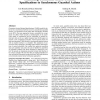681 search results - page 46 / 137 » A Logic for True Concurrency |
145
click to vote
ICFP
2004
ACM
16 years 1 months ago
2004
ACM
Concurrency, as a useful feature of many modern programming languages and systems, is generally hard to reason about. Although existing work has explored the verification of concu...
138
click to vote
ICFP
2005
ACM
16 years 1 months ago
2005
ACM
Proof-carrying code (PCC) is a general framework that can, in principle, verify safety properties of arbitrary machine-language programs. Existing PCC systems and typed assembly l...
127
click to vote
POPL
2010
ACM
15 years 11 months ago
2010
ACM
Concurrent programming errors arise when threads share data incorrectly. Programmers often avoid these errors by using synchronization to enforce a simple ownership policy: data i...
114
click to vote
ASIACRYPT
2001
Springer
15 years 6 months ago
2001
Springer
The number of communication rounds is a classic complexity measure for protocols; reducing round complexity is a major goal in protocol design. However, when the communication time...
143
click to vote
LCTRTS
2010
Springer
14 years 12 months ago
2010
Springer
Concurrent Action-Oriented Specifications (CAOS) model the behavior of a synchronous hardware circuit as asynchronous guarded at an abstraction level higher than the Register Tran...

